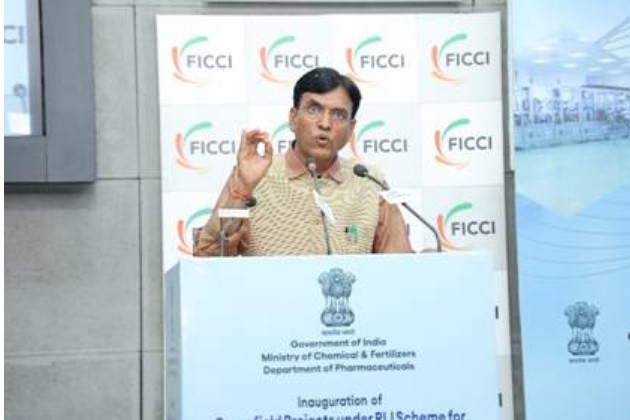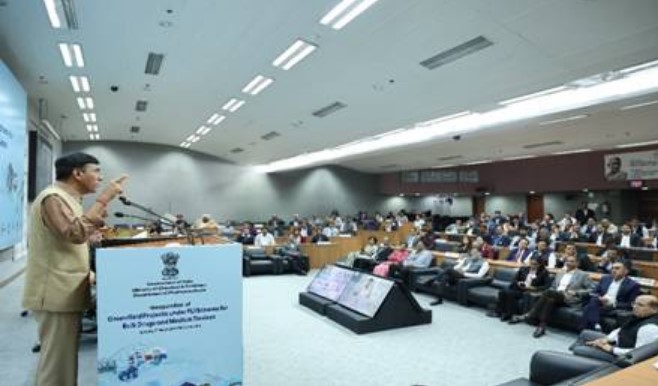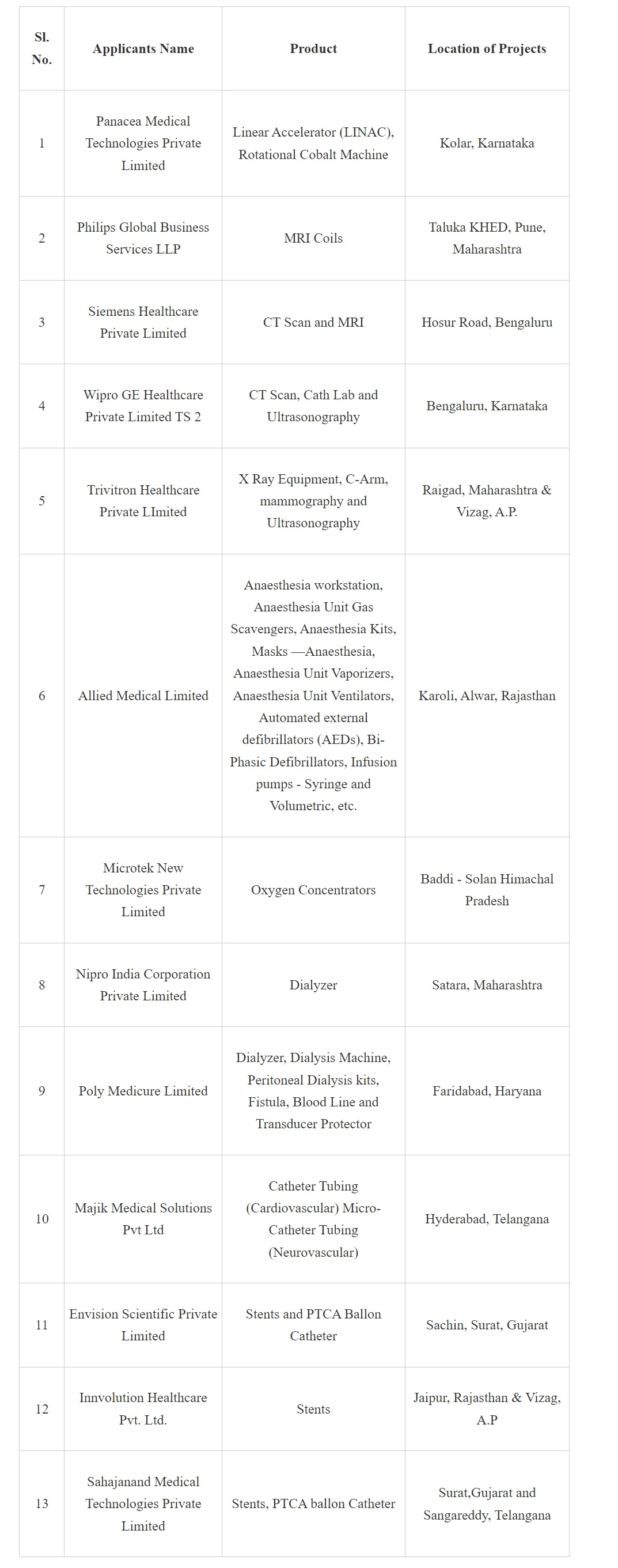Dr. Mansukh Mandaviya, Union Minister for Chemicals & Fertilizers and Health & Family Welfare virtually inaugurated 27 greenfield bulk drug park projects and 13 greenfield manufacturing plants for medical devices, here today.

Addressing the gathering, Dr Mandaviya said, “Medicines are an essential requirement for any society. During the COVID-19 pandemic, the dangers of supply chain getting affected, the risks of being highly dependent on imports of critical resources like bulk drugs and medical devices and its potential effects on India’s pharma and MedTech sector led to a lot of brainstorming within the Union Government. The Production Linked Incentive (PLI) scheme is a result of these wide-ranging discussions”
Expressing his elation at the inauguration of these greenfield projects under the PLI scheme, the Union Minister said, “it is noteworthy that today India has not only reduced its dependence on medicines, API and medical devices, the country is also emerging as a major exporter of these products, thanks to the success of the PLI scheme.”

Dr Mandaviya said that “the PLI-I scheme of the Union Government identified 48 critical bulk drugs for manufacturing locally. The success of this inaugural scheme led the government to launch the Rs. 15,000 crore PLI-II scheme which envisaged to increase our cost competitiveness for medicines and medical products in the international market”.
Highlighting the Union Government’s efforts towards making India atmanirbhar in the field of critical medicines and active pharmaceutical ingredients (API), the Union Minister stated the example of Penicillin G, a widely used drug which were locally manufactured in India until the late 1980s. Due to globalisation, the import of Penicillin G led to the closure of all such plants in India. He highlighted that the Union Government is working on bringing back production of Penicillin G in India after three decades.

The following are the key achievements highlighted in the meeting:
Shri Rajesh Kumar Singh, Secretary, Dept. for Promotion of Industry and Internal Trade noted that Union Government approached the COVID-19 pandemic with a mindset to turn the crisis into an opportunity. He highlighted the efforts of the administration in enhancing self-reliance, innovation and infrastructure, including both physical and digital as displays of such a vision.
Shri R K Singh stated that the PLI scheme was also envisaged through the same vision to bring in localisation and value addition to India’s pharma and MedTech industry and simultaneously also reduce over-dependence on critical resources from certain geographies.
Dr. Arunish Chawla, Secretary; Dept. of Pharmaceuticals gave a detailed presentation on the PLI scheme of the Union Government. He said that the drug and pharmaceutical industry in India witnessed a 12% compound annual growth rate (CAGR) in the last 10 years. He also highlighted that under the PLI scheme, as many as 1800 pharmaceutical products and formulations and 22 bulk drugs will be manufactured in India.
It was also informed that when the PLI scheme came in, India imported 90% of medical devices. After the introduction of the PLI scheme, the net imports of medical devices decreased for the first time in 2023.
The following are the details of bulk drug plants inaugurated today:
 The following are the details of medical devices plants inaugurated today:
The following are the details of medical devices plants inaugurated today:

Background:
Bulk Drug Parks: India is the 3rd largest player in drugs and pharmaceuticals by volume with an estimated industry size of US$50 billion in 2022-23 and exports accounting for 50% of the production. It is anticipated to reach a size of around US$130 billion by 2030. The Indian pharmaceutical industry, often referred to as ‘the pharmacy of the world’, contributes immensely to global public health and promoting universal healthcare access. India is the world's largest provider of generic medicines by volume, with a 20% share of total global generic supplies. It has the highest number of USFDA approved plants outside of the US and over 2000 WHO GMP certified plants in the country.
While India has excelled in formulations, there has been import dependence for certain critical bulk drugs, the vulnerability of which was acutely felt at the time of COVID -19 pandemic. The country is also vulnerable to price and supply risk on the import dependent raw materials, i.e. bulk drugs. The import dependence of bulk drugs in the country has been caused due to cost considerations and shift of the industry towards formulations, which is considered as more profitable. Further, the regulatory requirement for bulk drugs are more stringent, as the required environmental standards are to be met.
In order to attain self-reliance, reduce import dependence and enhance supply chain resilience in the critical import dependent bulk drugs - Key Starting Materials (KSMs)/ Drug Intermediates and Active Pharmaceutical Ingredients (APIs) in the country, the Department of Pharmaceuticals had launched a Production Linked Incentive (PLI) Scheme for promotion of their domestic manufacturing by setting up greenfield plants in four different Target Segments, i.e. Target segments 1 and 2 are fermentation based and Target segments 3 and 4 are chemical synthesis based. The scheme envisages manufacturing of 41 bulk drugs with a total outlay of Rs. 6,940 cr. during the tenure of the scheme i.e. 2020-21 to 2029-30. The scheme envisages incentive at the rate of 20% for first four years, 15% for fifth year and 5% for sixth year on eligible sales of fermentation based bulk drugs. In respect of chemical synthesis based bulk drugs, incentive is to be given at the rate of 10% for six years on the eligible sales.
The PLI scheme for bulk drugs will lead to reduced import dependence and better supply chain resilience. Investment worth Rs 3,651 crore has already been grounded, till December 2023, by the scheme participants. The increased investment has led to local capacity creation for critical bulk drugs on which the country was import dependent. The investment in fermentation based manufacturing also signals rediscovering of our strength in the area, which was affected on account of cheap imports.
The PLI scheme incentivizes domestic production of crucial APIs. The scheme further strengthens India's pharmaceutical self-sufficiency and would ensure steady availability of vital medications. Enhanced bulk drug production capacity through the PLI scheme positions India to not just become a producer of finished formulations, but also a prominent supplier of raw materials. It helps Indian companies develop capabilities and technology for manufacturing of complex APIs. The projects under the scheme are facilitated and supported by the Department of Pharmaceuticals by hand holding and bringing about required regulatory streamlining across the Government departments. PLI scheme for Bulk Drugs has laid the foundation for revitalizing of India's bulk drug industry, aiming to achieve self-reliance and regain global competitiveness.
Medical Devices: Medical devices industry is considered as one of India’s sunrise sectors. India is amongst world’s fastest emerging Medical Device market with exports from the sector growing steadily at a CAGR of around 14% since FY 2019-20. The market for medical device industry in India is currently estimated to be of the size of US$11 billion and it is expected to cross US$30 billion mark by 2050.
The Medical Device Sector in India suffered from cost of manufacturing disability vis-à-vis competing economies, inter alia, on account of lack of adequate infrastructure, domestic supply chain and logistics, high cost of finance, limited design capabilities, low focus on research and development (R&D) etc.
In order to mitigate the limitations affecting the sector, with an objective to boost domestic manufacturing and attract large investment in Medical Device Sector, the Department of Pharmaceuticals had launched a Production Linked Incentive (PLI) Scheme for Promotion of Domestic Manufacturing of Medical Devices to ensure a level playing field for the domestic manufacturers of medical devices. The total financial outlay of the Scheme is Rs.3,420 cr. for the period 2020-21 to 2027-28.
Under the scheme, financial incentive is given to selected companies at the rate of 5% of incremental sales of medical devices manufactured in India and covered under four Target Segments of the scheme i.e. (1) Cancer care equipment, (2) Imaging Devices, (3) Critical care devices, and (4) Body implants. Total 26 applicants have been approved for 138 products under the scheme. Investment of around Rs. 875 crores have already been grounded towards capacity creation under the scheme.
The inauguration of the above 13 Greenfield plants will be a big step towards achieving self-reliance in manufacturing of wide range of medical devices. With a wide base of scientists, bio-medical engineers, and a growing innovation ecosystem in the country, the India MedTech sector is poised to grow rapidly. Indian manufacturers are continuously innovating. Indigenous development of cancer care equipment, such as Linear Accelerator for radiotherapy and evolved coronary stents, under the PLI scheme, are illustrious example of the same.
The PLI scheme encourages manufacturers to invest in R&D activities to develop innovative products and technologies. The scheme has enabled technology transfer in high-end medical devices enhancing our capabilities. The PLI scheme creates opportunity for India to become a significant player in the export of medical devices. The scheme lays pathway for development of entire ecosystem of medical device manufacturing, which includes the components and sub components used in manufacturing of medical devices.
Shri Kamlesh K Pant, Chairman, National Pharmaceutical Pricing Authority (NPPA); Dr Sailesh K Pathak, Secretary General, Federation of Indian Chambers of Commerce and Industry (FICCI) and senior officials of the Union Government were present on the occasion.